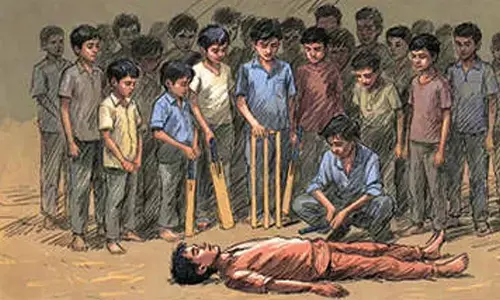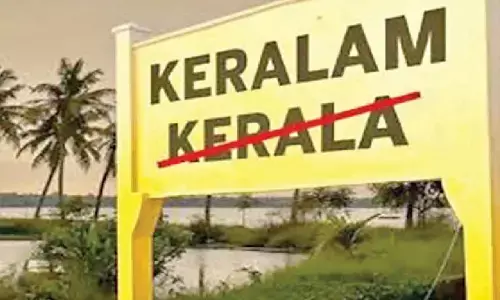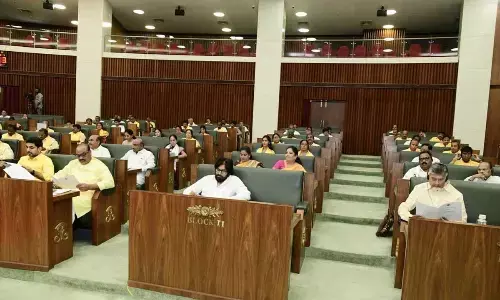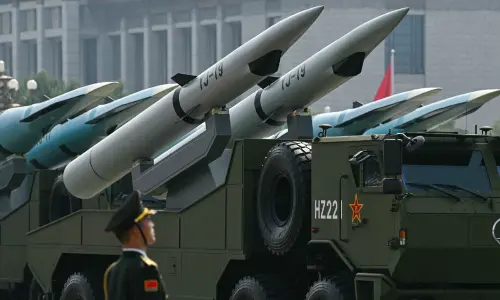BJP relegates Temple card

BJP Relegates Temple Card. BJP President Rajnath Singh’s offer of apology to the Muslims for any hurt caused to them notwithstanding its element of surprise did not create the intended sensation.
BJP President Rajnath Singh’s offer of apology to the Muslims for any hurt caused to them notwithstanding its element of surprise did not create the intended sensation. The offer tentative as it was vague and thus is interpretable in several ways: is it a virtual apology, a belated remorse or just an expression of good will towards an estranged community? A good sign, however, that a powerful group of the hard-core Hindutva umbrella has at last realised the wisdom of according recognition to the country’s biggest minority and conceding it to be a force of some significance.
Singh’s gesture came in the course of his interaction with the representatives of the Muslims in the capital recently. No party spokesman spelt out the details of the meetings or about those invited but on a closer examination it looked that the interaction was really a conclave of the units of the party’s central minority front and the participants were office-bearers from different States. It was thus more of an in-house affair, so to say. Yet, the message inherent in the BJP President’s observations cannot be passed over as inconsequential in the context of the repetitive demand that the party’s prime ministerial aspirant Narendra Modi should apologise for the excesses of the Gujarat riots in 2002 matched only by his equally persistent refusal to do so and own the responsibility. The maximum that Modi has done so far is to strike a conciliatory note about “Hamare Musalman Bhaiyon”.
However, there was another interaction with the members of the Muslims community with the AAP leader Arvind Kejriwal. Incidentally, this actually preceded the BJP’s one following an invitation from a section of Muslim leaders thus making a significant difference. The core point is that a supposedly political greenhorn should again secure a brownie point over old stock parties of the Congress and the BJP. It inevitably refurbishes the AAP’s boast of setting the political agenda for the coming electoral battles. The irony of it is apparent. The AAP’s style of politics has been different in its approach to the electorate—at least so far. Indeed, the strategy paid dividends during its maiden electoral fray in Delhi where it fought on the sole plank of anti-corruption but uniformly evoking support from different sections of society ranging from middle class layers down to the rungs of the poor and deprived, fetching it a surprisingly high margin of victory over the Congress and narrowly missing the top position to the BJP. The tally of 28 in the 70-member state assembly was large enough to whet the AAP’s national ambitions. Hence current present needs to look for more identifiable areas of support on the national scene. A more welcome aspect of this unfolding political scenario is the prospect it has opened up for wider choice for the electorate. This is particularly so from the point of view of the minority groups and weaker sections like Dalits and backward and OBCs who can now look beyond the Congress and the BJP.
The idea of bipolar system has neither taken a firm root nor has it been found feasible—both the major parties having the same systemic and class complexion even if in varying degrees. The AAP’s Kejriwal has evoked popular empathy by calling for change in system. It is a moot question how far the new-born and as yet and amorphous entity will emerge in a position to fill the vacuum. There is another formation coming up in the form of a third front or a federal front of eleven-plus parties spearheaded by the Left and Jayalalithaa apart from others like, Mulayam Singh Yadav, Nitish Kumar and probably Navin Patnaik. The division of Andhra Pradesh has opened the way for further formations in Seemandhra and the new Telangana state. On the face of it, this does not bode well coming as it all does at a phase of political instability. Even as the media predicts some type of a Modi-wave it is yet to be substantiated on the ground. The BJP’s apology offer needs on a closer look and revelatory of a feeling of uncertainty on the part of the party’s poll-gazers. The NDA itself has been a shrinking proposition and hence the hectic search of allies by the BJP. Small-scale mergers of the minuscule entities like Ram Vilas Paswan’s LJP or of the Vaiko group in Tamilnadu are coming to be hailed as big catches. After all, the picture for the Congress may not turn out to be as bleak as it appears to be at the moment. Large chunks of Muslims and of course the powerful secular segments can still come to its rescue and foil the right-wing gamesmanship.
It looks that there is little possibility of an electoral wave building up, definitely not of the 1971 or 1977 variety to be the decider in 2014. Indeed, a swing in favour of a particular party cannot be ruled out in some States and it may be to the gain of the BJP’s ‘development man’ Narendra Modi too. But there is little to show it at the national scale. This factor lies inherent in the BJP’s olive branch to the Muslim or Modi’s friendly gestures to the tribals in the north-eastern states as indeed in his repeated emphasis on his humble OBC origin. It will be no surprise Modi himself takes half-step forward from the BJP chief’s gesture to the Muslims even if it be too-little too-late. A redeeming feature in this divisive background is the relegation of the Temple card and majoritarianism into the background and the proponent’s willingness to come to terms with democratic imperatives. Yet, one has to pay the price and invest first before expecting the dividends.








